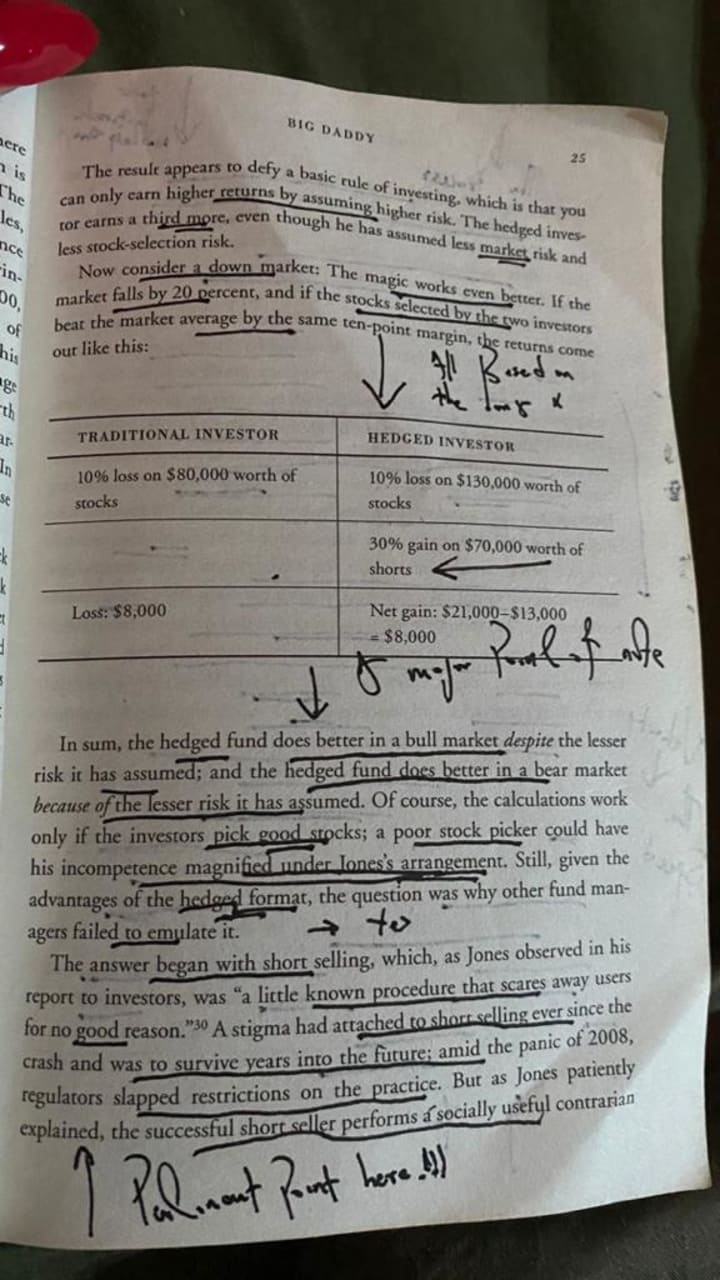Alfred Winslow Jones: The Big Daddy of Hedge Funds.
He never went to business school nor acquired a finance PhD and yet his innovations in finance changed the world forever. who is Alfred Winslow Jones and exactly what were his innovations?

Today when people think of hedge funds, the names which easily trip off the tongue are George Soros of quantum, Paul Tudor Jones of Tudor Investment corporation,Steve Cohen of SAC Capital, Ken Griffin of Citadel and Cliff Asness of AQR; David Shaw of D.E. Shaw, James Simon of Renaissance medallion, John Paulson of Paulson and company, Tom Steyer of Farallon and most infamously - John Merriwether of Long Term Capital Management. And yet all of these players, who have collectively made several hundreds of billions owe their methods to a gentleman, whose name, with which, millions of people around the world are completely unfamiliar.
So who exactly is Alfred Winslow Jones and how did he come about his ideas and innovations?
The Background
Alfred Winslow Jones was born on the 9th of September 1900 to an American General Electric executive, working in Australia. Moving back with his parents to Schenectady New York, he went to school there and following in the family tradition - attending Harvard. Given that he came up in the during the Jazz age - so memorably depicted in the seminal work by F. Scott Fitzgerald, 'The great Gatsby', he could be easily forgiven for rejecting the conventional routes open to him from acquiring an Ivy league education, plumbing instead for a job as a purser on a tramp steamer and spent a year travelling the world.
On his return to the United States, he took the foreign service exam, which led to his posting to the state department in Germany. His deployment to Berlin,Germany coincided with the nation's hyperinflation woes and its inexorable slide to genocidal fascism. During this time, he met and fell in love with a Anna Block, an attractive and flirtatious lady,who worked as an anti-Nazi activist, who was also something of a creative in finding various ways of escaping detection from the National socialists.
His secret marriage to Ms. Block and his forced resignation from the state department would lead him to working for a secret Leninist organization, something, which came to the notice of the British authorities. His eventual divorce from Ms. Block and his next career move would set him up for the revolution that he brought about in the world of finance.
Despite his connections to the leftist organizations, in his past life being intact, by the time he enrolled for a graduate degree at Columbia University in 1934, We see a different Alfred Winslow Jones emerging altogether; one whose political views had begun to move to the right of center. The political and economic upheavals of the 1930s, in Spain, Germany and in his native country had crystallized his views along the moderate side of the spectrum.
His PhD thesis titled: Life, Liberty and Property in 1941, became a sociology textbook, which launched him on a career as a journalist. His work was printed in condensed form in the fortune magazine and signed on in working for the establishment. His world view gravitated towards respect for the market and repudiation of socialism - the ideal, in his view - was a left-right blend.
As conservative as possible in protecting the free market and as radical as possible in securing the welfare of the people.
Writings on Finance
In a writing assignment for his paymasters at the fortune magazine, our hero turned his guns to finance, in the resulting essay which appeared in 1949 titled: Fashions in forecasting, Alfred Winslow Jones' central insights presciently anticipated his hedge fund successors in the late twentieth and twenty-first centuries.
Mr. Jones, in eviscerating the old, traditional methods of predicting stock market performance, which entailed commodity prices and other economic data to determine stock prices - which, in common parlance is referred to as 'fundamental analysis' and pointing out that although money might be an abstraction, a series of numerical symbols, it was a medium through which greed, envy and exuberance expressed themselves; a barometer of crowd psychology or madness - touched on something incredibly important.
Also important was the fact that investor emotions created trends in stock prices, which leads to a rise in investor optimism, which in turn generates further optimism etc. The cycle generated by stock price increase, creates a trend that can be tracked profitably. The supreme skill is knowing when to bail out when the crowd psychology heads in the opposite direction.
Not forgetting that Jones was a sociologist, who was knew little academic economics was, at least on one thing, on the same page as Alfred Cowles - the leading statistical economist of the time - the successful market forecasters could not sustain their performance - a perspective that we would come to fully appreciate with the collapse of a number of hedge funds, not least of which was Long Term Capital Management in 1998 and Sowood Capital, in the 2000s.
The Financial Innovations
It is pertinent to point out that going long or short have always been with us; The wall street crash in 1929, being a perfectly strong case in point. What Alfred Winslow Jones has done, differently are as follows:
- The setting up of Hedge funds as structured private arrangements, to circumvent the regulatory red tape of the state and to preserve the flexibility of its investment choices.
- The balancing of 'shorting' unpromising shares with going long on promising shares.
- The use of leverage (debt)in taking 'short positions'. Short position is best defined as investing in a stock or an asset and profiting off it when the value falls.
- Charging a performance fee of 20%; The reasons for this charge was to get round the huge taxes being levied by the government and also as a performance incentive for traders.
In the image below, for which the author's permission was sought and granted, we see a basic explanation of how the whole set up works.
Jones' methods had anticipated the Nobel prize winning economist William Sharpe's 'A simplified Model for portfolio analysis', by more than a decade.

Exactly how practical were these innovations then and How useful are they now?
Once Jones set these ideas in motion and raised funds($100,000) from his friends and personal coffers. He had racked up nearly 5,000% in returns by 1968. This meant that investors who had given him $10,000 in 1969, was now worth $480,000 in 1949. Mr. Jones' performance at its peak was twice as much as his nearest competitor, in the 1960s.
These innovations made it possible for George Soros and his lieutenant, Stan Druckenmiller, in September 1992, to pile on the leverage to the maximum in betting against the pound, when the Bank of England made the profoundly erroneous decision in backing the currency at a time it had no business doing so. George Soros made a profit of $1 billion.
Alfred Winslow Jones' ideas were also instrumental in ensuring that Paul Tudor Jones was able to assume a 'short position' and emerge as one of the very few traders who made a huge profit on the 19th of October 1987, commonly known as 'Black Monday'.
When David Swensen of Yale made the decision to invest the Ivy league university's endowments with Tom Steyer's Farallon Capital, these methods again proved quite useful in generating $7.8 billion out of its $14 billion endowment.
When a preternaturally gifted chartist or technical analyst discovered that there was something seriously wrong with the mortgage securities and a huge default was in the offing, John Paulson, the great contrarian in 2005–2006, took the step of buying as many credit default swaps (an insurance policy) as possible to short the mortgage bonds.
The use of leverage had allowed John Paulson to build a vast short position of 7.2 billion dollars for his fund. By the morning of the 8th of February 2007, he had netted 1.2 billion dollars - slightly exceeding the amount that George Soros made when he broke the back of the bank of England.
Ken Griffin is another heavy weight player, who was in the news recently for orchestrating the purchase of a hedge fund (Melvin Capital)whose value collapsed precipitously in the aftermath of a short squeeze. His firm, Citadel is one of the longest surviving funds in the industry and his net worth is $21 billion. His application of the innovations pioneered by Jones has played a huge part in continued success.
Final Conclusion
Alfred Winslow Jones wore several hats over the course of his nine decades on earth; He had worked as a spy (married one too!), journalist, hung around beatniks, spied on his old comrades, but his innovations in finance were simply borne out of the need to earn decent money to support his family and yet his improvisational genius helped paved the way for the cast of characters, who dominate the world of high finance, today.
Through the economic downturns that we have experienced over the course of the late twentieth and early twenty-first centuries, hedge funds are showing absolutely no signs of slowing down; Be they event driven or multi strategy hedge funds - one thing is for certain - they are here to stay and for that alone, the industry owes one man a huge debt of gratitude and his name?
Alfred Winslow Jones.
Thanks very much for reading.
Thanks very much to Professor Sebastian Mallaby for graciously allowing me to use an annotated page of my copy of his great book 'more money than God '.
About the Creator
Adebayo Adeniran
A lifelong bibliophile, who seeks to unleash his energy on a number of subjects






Comments
There are no comments for this story
Be the first to respond and start the conversation.